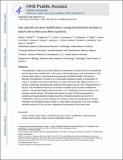| dc.contributor.author | Witte, Martin D | |
| dc.contributor.author | Wu, Tongfei | |
| dc.contributor.author | Guimaraes, Carla P | |
| dc.contributor.author | Theile, Christopher S | |
| dc.contributor.author | Blom, Annet E M | |
| dc.contributor.author | Ingram, Jessica R | |
| dc.contributor.author | Kundrat, Lenka | |
| dc.contributor.author | Goldberg, Shalom D | |
| dc.contributor.author | Ploegh, Hidde | |
| dc.contributor.author | Li, Zeyang,S.M.Massachusetts Institute of Technology. | |
| dc.date.accessioned | 2017-03-07T19:21:07Z | |
| dc.date.available | 2017-03-07T19:21:07Z | |
| dc.date.issued | 2015-02 | |
| dc.identifier.issn | 1754-2189 | |
| dc.identifier.issn | 1750-2799 | |
| dc.identifier.uri | http://hdl.handle.net/1721.1/107224 | |
| dc.description.abstract | Transpeptidation catalyzed by sortase A allows the preparation of proteins that are site-specifically and homogeneously modified with a wide variety of functional groups, such as fluorophores, PEG moieties, lipids, glycans, bio-orthogonal reactive groups and affinity handles. This protocol describes immobilization of sortase A on a solid support (Sepharose beads). Immobilization of sortase A simplifies downstream purification of a protein of interest after labeling of its N or C terminus. Smaller batch and larger-scale continuous-flow reactions require only a limited amount of enzyme. The immobilized enzyme can be reused for multiple cycles of protein modification reactions. The described protocol also works with a Ca[superscript 2+]-independent variant of sortase A with increased catalytic activity. This heptamutant variant of sortase A (7M) was generated by combining previously published mutations, and this immobilized enzyme can be used for the modification of calcium-senstive substrates or in instances in which low temperatures are needed. Preparation of immobilized sortase A takes 1–2 d. Batch reactions take 3–12 h and flow reactions proceed at 0.5 ml h[superscript −1], depending on the geometry of the reactor used. | en_US |
| dc.description.sponsorship | National Institutes of Health (U.S.) (NIH grant no. RO1 AI087879) | en_US |
| dc.description.sponsorship | Netherlands Organization for Scientific Research (NWO) | en_US |
| dc.language.iso | en_US | |
| dc.publisher | Springer Nature | en_US |
| dc.relation.isversionof | http://dx.doi.org/10.1038/nprot.2015.026 | en_US |
| dc.rights | Article is made available in accordance with the publisher's policy and may be subject to US copyright law. Please refer to the publisher's site for terms of use. | en_US |
| dc.source | PMC | en_US |
| dc.title | Site-specific protein modification using immobilized sortase in batch and continuous-flow systems | en_US |
| dc.type | Article | en_US |
| dc.identifier.citation | Witte, Martin D., Tongfei Wu, Carla P. Guimaraes, Christopher S. Theile, Annet E. M. Blom, Jessica R. Ingram, Zeyang Li, Lenka Kundrat, Shalom D. Goldberg, and Hidde L. Ploegh. “Site-Specific Protein Modification Using Immobilized Sortase in Batch and Continuous-Flow Systems.” Nature Protocols 10, no. 3 (February 26, 2015): 508–516. | en_US |
| dc.contributor.department | Massachusetts Institute of Technology. Department of Biology | en_US |
| dc.contributor.department | Whitehead Institute for Biomedical Research | en_US |
| dc.contributor.mitauthor | Ploegh, Hidde | |
| dc.relation.journal | Nature Protocols | en_US |
| dc.eprint.version | Author's final manuscript | en_US |
| dc.type.uri | http://purl.org/eprint/type/JournalArticle | en_US |
| eprint.status | http://purl.org/eprint/status/PeerReviewed | en_US |
| dspace.orderedauthors | Witte, Martin D.; Wu, Tongfei; Guimaraes, Carla P.; Theile, Christopher S.; Blom, Annet E. M.; Ingram, Jessica R.; Li, Zeyang; Kundrat, Lenka; Goldberg, Shalom D.; Ploegh, Hidde L. | en_US |
| dspace.embargo.terms | N | en_US |
| dc.identifier.orcid | https://orcid.org/0000-0002-1090-6071 | |
| mit.license | PUBLISHER_POLICY | en_US |
